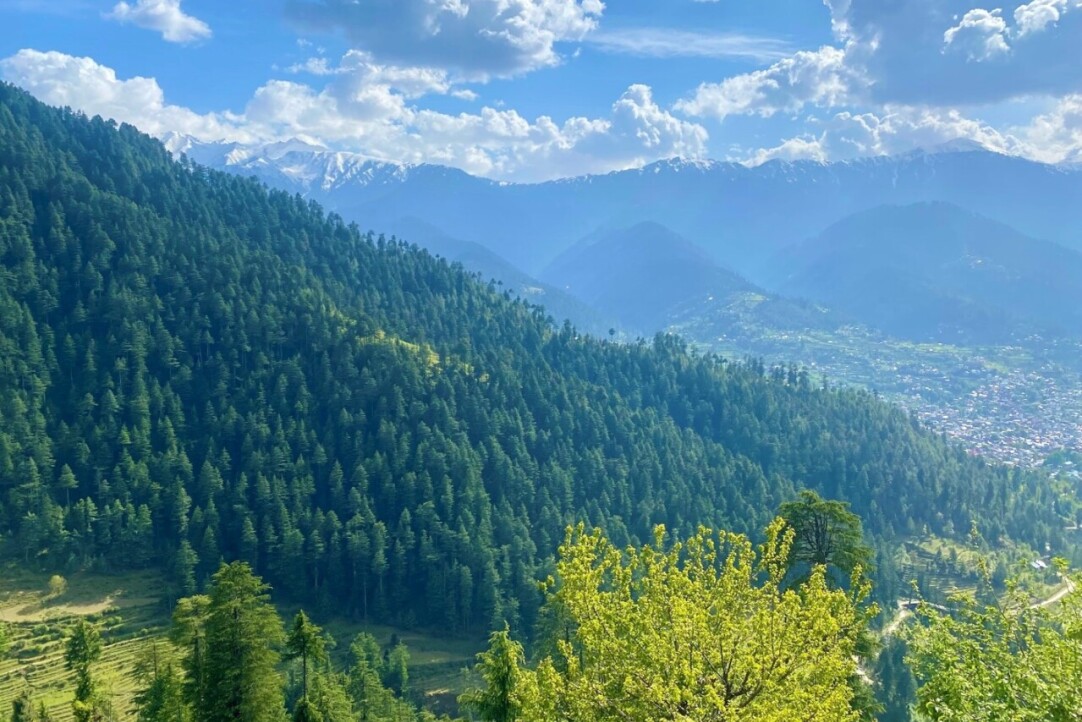'Joint Background in Political Science and Anthropology Turned Out to Be Invaluably Useful in Studying the Region'
From April 26 to May 7, a team of professors and students from HSE University-St Petersburg conducted a field study in the Indian Himalayas. We asked Aleksei Sorbale, an academic supervisor of the Bachelor's programme 'Political Science and World Politics', and Pavel Bazarov, a graduate of the Bachelor's programme and a student of the Master's programme 'Global and Regional History', to tell us about their research and share their impressions of the expedition.

Pavel Bazarov

Graduate of the Bachelor's programme 'Political Science and World Politics', Student of the Master's programme 'Global and Regional History'
Do I even have to say that the expedition in the Himalayas went extremely well and was absolutely unforgettable? Exciting landscapes, rushing rivers and authentic friendly locals have left a lasting impression. But, of course, it is not only about collecting emotions and impressions. The expedition turned out to be truly efficient and scientifically useful despite its short duration. We managed to conduct interviews with the widest reach of respondents: researchers, representatives of the local administration and, of course, representatives of the local peoples of Bakarwal and Gaddi. Thanks to these interviews and overt observation, we managed to learn a lot not only about climate change and its effects but also about internal migration in India, the sustainability of local communities, and modernisation processes.
I as an anthropologist was especially keen on conducting interviews with nomads from the Bakarwal people who are still sticking to the traditional lifestyle. I felt like I was an anthropologist of the early 20th century who managed to reach a remote corner of the Earth and got a chance to explore hitherto unknown and wonderful peoples. However, I wouldn't be able to form a comprehensive image of the Himalayas and India in general without my background in political science. Especially, the knowledge I gained in the courses 'Geography and Development' and 'Political Analysis' came in handy. The former helped me to understand which specific conditions give rise to the nomadic lifestyle of the Himalayan peoples and how institutional and behavioural difficulties between mountain people and plains people were formed. 'Political Analysis' helped me to understand why political programmes developed in Delhi do not always work and are not always effective in the Himalayas. For instance, I noticed that such programmes often lacked consultations with the local actors or that the 'transfer' of a political course from one environment to another was not performed qualitatively enough. Summing up, I would like to highlight that joint background in political science and anthropology turned out to be invaluably useful in studying the region where traditions and modernisation are closely intertwined and influence each other.

Academic Supervisor of the Bachelor's programme 'Political Science and World Politics'
Research groups which have visited the state of Jammu and Kashmir over the last decades are few and far between. The North of the state is not very happy to welcome tourists. Transport infrastructure only starts to develop. 'Last year, you would have to go to Jammu by horses', one of the respondents stated. Finally, almost nobody speaks English here, not everyone even knows Hindi. Proceeding from all these, our key task was preliminary research and accumulation of knowledge about the region.
The expedition was held together with colleagues from the University of Delhi. We established relations with some of them back in February during the visit of the delegation from the School of Social Sciences to the leading Indian universities. The main goal of our pilot study was to define the main patterns of climate and ecology changes in different districts of Jammu and Kashmir, to assess anthropogenic influence on the environment as well as to study the impact of these factors on economic and pastoral activities in the Indian Himalayas. The geography of our inquiries was quite wide. Our route started in Delhi, and then we moved to the North—in Baderva, the capital of district Doda, from there—directly to remote villages in the very north of the state. Just like in a famous song, we moved between the intermediary points by all available means: trains, buses, cars, auto rickshaws... We covered 30 kilometres to the farthermost villages in Kishtwar district on foot with rucksacks along a mountain road, back and forth.
The pool of our respondents represents a great variety as well. We managed to interview different groups: government officials (police officers, the regional commissioner for agriculture), representatives of the Academy, farmers with different levels of income, traders and even nomads, who move on the goat paths of the Great Himalayas below or above the conditional line of 3000 metres depending on the season. As we adapted the interview guide to representatives of different groups, in my opinion, we received a fairly complete and complex picture of large-scale climate and ecology changes in the region of the Indian Himalayas. Many respondents pointed to large climate change which radically altered the image of pastoral activities in this region: increase of snow accumulation, an increasing number of invasive species, new diseases of cattle, ablation, shifting of seasons, extinction of old agricultures and their replacement with new ones.
Large-scale climate change and anthropogenic activities in the Indian Himalayas led the local communities to the traditional 'tragedy of the commons'. For me, an especially important subject was studying the interactions between local citizens and district, regional and federal authorities in terms of assistance to affected households and (re)distribution of valued resources: water, energy and agricultural products. The study of this question showed that the assistance of the state and authorities at different levels to the local communities is uneven, and these targeted measures are not always effective. The reasons for these peculiar 'government failures' are still to be identified.
An important product of our expedition will be a documentary film which is now being prepared by our colleagues from the Departments of Sociology and Media Communications. Besides, we plan to publish several articles in high-ranking journals in collaboration with researchers from the University of Delhi.
In a broader perspective, together with Indian colleagues, we plan to expand the geography of research and cover Bhutan, Nepal, and other regions of the Indian Himalayas—Assam and Sikkim. This means that new expeditions are to come!

